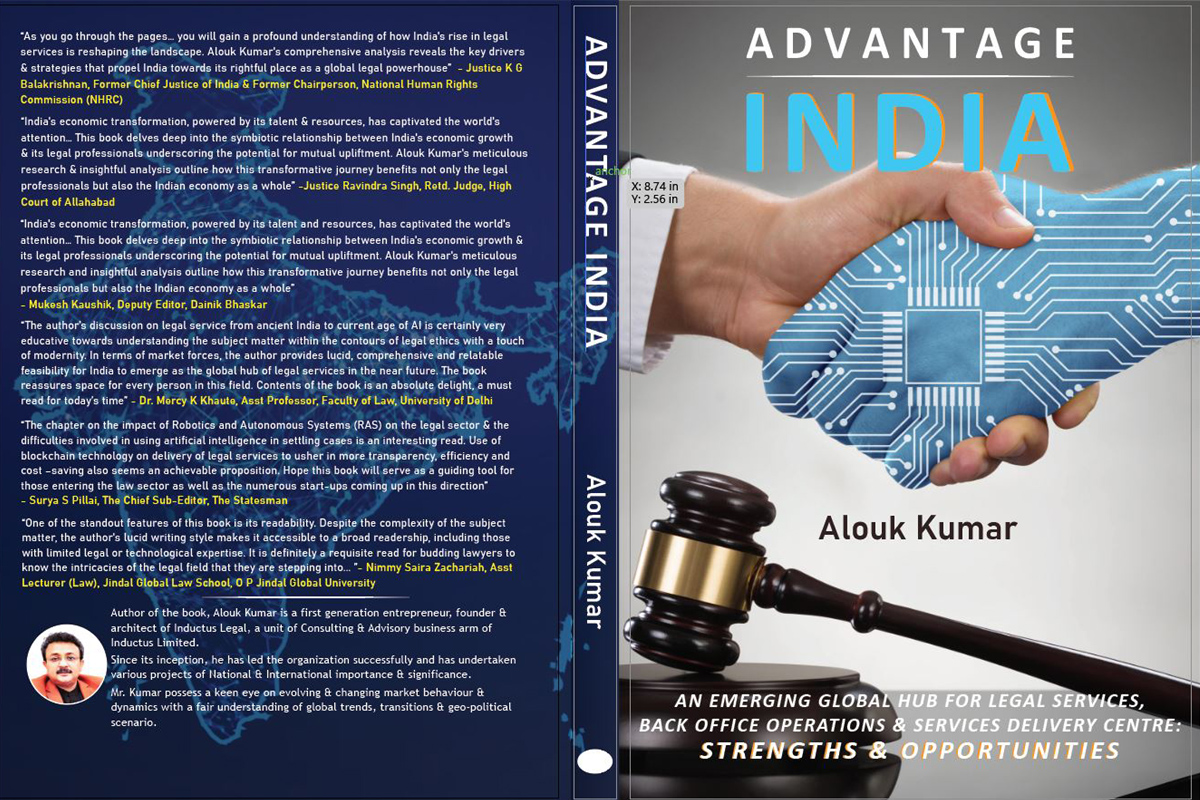India is emerging as a global hub for legal services and replicating the same phenomenon of growth, employment generation and global supremacy as the Information Technology industry did a decade or two ago. This is the crux of the book “Advantage India” by Alouk Kumar, Managing Director & CEO, Inductus Limited .
Kumar, who interviewed legal luminaries, law practitioners and aspiring lawyers for the book, believes that India is the next big business opportunity in the making.
Advertisement
“The book is all about the rapidly changing world, where globalization and technological advancements are transforming industries and creating new opportunities. In this background, it is imperative for countries to adapt and harness their strengths to carve a niche. And that is exactly what the book ‘Advantage India’ showcases – India’s remarkable journey towards becoming a global hub for legal services, back-office operations and services delivery centres,” he says.
Asked why he believes that the world will look towards India to solve its legal hassles, the author says over the past few decades, the country has capitalized on its vast pool of skilled professionals, favourable economic policies, and an innovative mindset to carve a niche for itself in the global market.
He says India today stands proudly as a preferred choice for countless organizations worldwide, seeking professional legal expertise and efficient business support services.
“From a highly talented, educated and tech-savvy workforce to its robust legal system, India offers a unique blend of expertise and affordability,” he says.
Talking about the impact of technology, especially artificial intelligence (AI) and ChatGPT on the functioning of the legal industry, he says, “Conventionally, one used to visit a lawyer to prepare legal documents, but now you can get these by sitting in one’s bedroom, thanks to ChatGPT. In the west, the legal practitioners are now feeling the pinch. They are losing business due to these technological interventions.”
“Here enters countries like India which can provide excellent services at a comparatively low cost. The phenomenon which took place with the IT industry will happen again with the legal industry, and we should be ready to reap the benefits,” he adds.
Kumar also talks about how most of our practising lawyers do not want to embrace technology.
“Hats off to our Chief Justice D Y Chandrachud for advocating technology-friendly courts. During the coronavirus epidemic, our courts went online. Now one can watch the proceedings from the comfort of our homes. Having said that, we still have a long way to go. Lower courts are still not organised, in terms of technology.
“Many lawyers today possess the latest iphones, but they will only use them to make or receive calls. They do want to embrace or even acknowledge the importance of technology,” he says.
So don’t we need to address these challenges of digital divide if we are to emerge as a global power to reckon with.
“Of course. The Bar Council of India’s recent decision to allow foreign legal firms to set shops in India is a step in this direction. The markets need to be opened for global competency to kick in. But the country’s metropolitan cities are up for the challenge,” the author adds.
In the foreword of the book, former Chief Justice K G Balakrishnan says the book “adeptly reflects the entrepreneurial spirit that permeates India’s legal services industry, exploring the countless opportunities it presents for partnerships, collaborations, and shared growth”.
The book, divided into 13 chapters, delves into a variety of subjects like the ancient Indian legal system, the vedas, cyber security, data protection, automation, international arbitration, among others.
The book also states that the Indian legal services industry is projected to reach a staggering and significant value of USD 1.6 billion by 2026.
In the chapter on ‘Client Expectations’, the book notes people are increasingly demanding a more personalized approach from their law firms. This requires the law firms to invest in building strong relationships with their clients and understanding their businesses on a deeper level. This could mean embracing new technologies such as virtual reality for courtroom simulations, utilizing data analytics to predict legal outcomes, or even employing chatbots for initial client consultations.
Kumar says, according to official data, India produces 70,000 law graduates every year. “India’s strength is its IT supremacy. Our qualified manpower also sets us apart from other economies. It is time we utilise our resources and rise up to the occasion,” he says.
The book has been published by Prabhat Prakashan and is priced at Rs 300. It will be available at all popular online portals and book stores from December 22.











